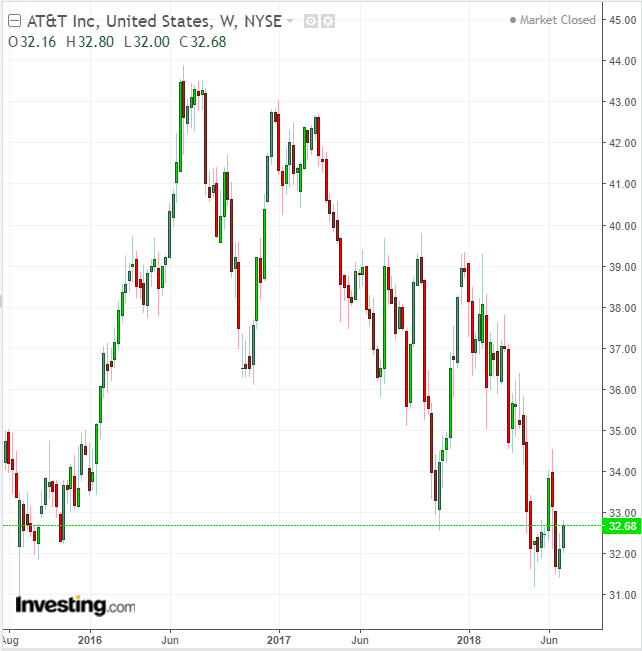Divided paying stocks can be a reliable cornerstone for any income oriented long-term investor. But choosing stocks just because they provide what appears to be a rich dividend isn’t necessarily a winning strategy.
In the US, there are many stocks that offer attractive yields, but not all are worth owning. In many cases those hefty payouts are simply not sustainable. If you're trying to build a nest egg, or counting on reliable dividend payouts to help with ongoing expenses, the worst thing you can do is buy shares in a company that might be cutting its dividend payout in the near, or even longer term future.
Since the dividend yield is the ratio of the stock's price relative to the dollar value of the dividend payout, a juicy yield could be a function of the success of a particular company's business model as it relates to their share price. That's the positive version of a yield payout.
However that's not always the case. In many instances a higher yield should be regarded as a red flag since there's actually a less favorable message being signaled; a robust dividend could also be telling investors the stock may be risky. To offset the higher rise, in some cases companies are willing to use a larger than average dividend as a lure for what might otherwise not be a very appealing investment.
That said, there's no reason to ignore stocks offering high yields. If an investor is willing to do the research, there are number of companies that provide a good risk-reward equation. One such example is AT&T (NYSE:T), the second-largest wireless carrier in the U.S.
The dividend yield offered by this telecom giant remains very attractive. At 6.23% based on Friday's closing price of $32.68, it’s almost double the return on the risk-free, 10-year Treasury bond and 3.4 times the average dividend yield of all S&P 500 companies.
Nonetheless, before deciding to lock in this sizeable return, the savvy investor should understand what’s driving AT&T's dividend yield higher.
Elevated Leverage

The biggest concern for investors is whether AT&T's high level of debt will hamper the company's ability to sustain its $2-a-share annual payout. That’s by far the largest drag on the company’s share price overall. The stock has lost a quarter of its value during the past 2 years.
These concerns have escalated yet further since the company closed its $85-billion merger with Time Warner Inc (NYSE:TWX) last month, following a two-year-long court battle. The purchase made the company the most indebted, non-financial entity in the US, bringing AT&T's debt load to $180 billion.
If the capital markets continue to function normally, too much debt isn’t a matter of concern for big companies such as AT&T. However, during a financial crisis, AT&T might have to struggle to raise funds with which to refinance its maturing debt.
Moody’s Investors Service raised similar concerns and cut AT&T’s credit rating last month. It lowered the company’s rating by one notch, two levels above speculative grade, on concerns that the Time Warner deal will raise AT&T's leverage to around 3.7 times EBITDA (earnings before interest, taxes, depreciation and amortization), by the end of this year.
However, if you’re a long-term investor you might have a different take on this situation. Though AT&T’s debt is growing fast, it's common for responsible companies to borrow for growth with which to generate future cash flows. Because of the Time Warner deal, AT&T now has some of the best media assets under its umbrella, including CNN, HBO and Warner Brothers Studios.
These new content sources will help to turn the company into an entertainment giant that can feed exclusive programming to its 119 million mobile, internet and video customers. At a time when traditional pay TV customers are cutting cords at the fastest pace in the past five years, AT&T is now in a much better position to compete with disruptors such as Netflix (NASDAQ:NFLX).
Bottom Line
With a 34-year history of delivering annual payout growth, it's highly unlikely AT&T's dividend will be cut—particularly when the company is entering a new growth phase. Telecom utilities operate in an oligopoly and provide one of the best avenues for parking your long-term investment and earning a steady income. As well, the company has a respectable payout ratio of 40%.
It’s very difficult for new entrants to threaten a rival's dominant position, one that's been built after decades of company investment. Despite all the setbacks AT&T has experienced with its pay-TV segment, it's still the second-largest wireless carrier in the US. It has a market share of 33.4% and a forward price-to-earnings multiple of 9. After its recent dip in share price, along with its rich annual dividend yield of 6.23%, we believe AT&T is a solid buy.
